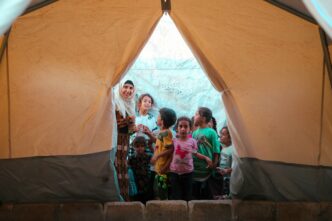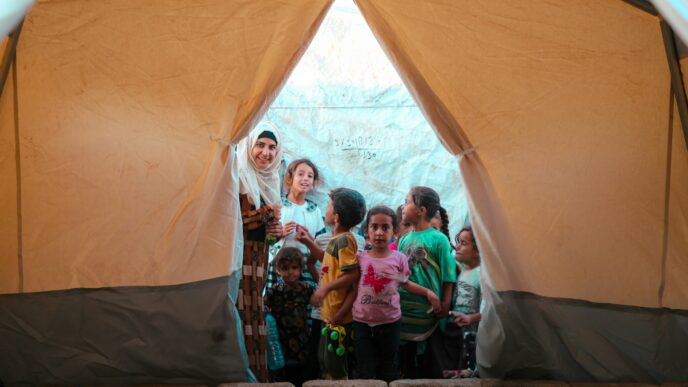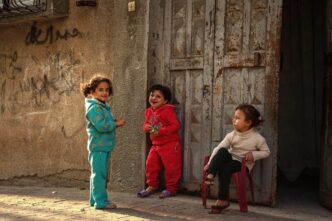Muslim refugees arriving in Europe face deeply embedded systemic discrimination that affects their daily lives, from access to employment and housing to social services. Anti-Muslim racism, often driven by widespread Islamophobia, exacerbates their marginalization. Studies by the European Union Agency for Fundamental Rights (FRA) have consistently reported higher instances of employment discrimination, with Muslim applicants significantly less likely to be hired compared to non-Muslim counterparts with similar qualifications.
The securitization of Islam further worsens their plight. The portrayal of Muslims as security threats, particularly in the wake of terrorist attacks, has led to policies that conflate religious identity with extremism. Governments across Europe have implemented counterterrorism measures that disproportionately target Muslim communities, often resulting in heightened surveillance, arbitrary detentions, and restricted access to asylum for individuals from Muslim-majority countries. This securitized approach not only breeds distrust but also contributes to a hostile environment for Muslim refugees seeking stability.
Policy Biases and Political Rhetoric
The rise of far-right political movements in Europe has amplified xenophobic and Islamophobic rhetoric, framing Muslim refugees as threats to national identity and security. Parties in countries such as France, Germany, and Italy have weaponized anti-immigrant sentiments to gain political traction, influencing mainstream policy discussions.
Policies have become increasingly restrictive, particularly for asylum seekers from Muslim-majority countries. In Denmark, the government has introduced legislation allowing the revocation of refugee status if authorities determine that conditions in the home country have “improved,” a policy disproportionately affecting refugees from Syria and Afghanistan. Similarly, Hungary’s stringent border policies and refusal to accept asylum seekers have disproportionately affected Muslim refugees, reflecting broader Islamophobic biases in European immigration laws.
Media Representation and Public Perception
The media plays a crucial role in shaping public perception of Muslim refugees, often portraying them through a lens of criminality, dependency, or cultural incompatibility. Negative depictions in mainstream outlets reinforce stereotypes, fueling societal fears and justifying restrictive immigration policies.
Comparative analyses show that while Ukrainian refugees have been widely embraced across Europe with narratives of solidarity, Muslim refugees from Syria, Afghanistan, or Sudan have often been met with skepticism and hostility. This stark difference in representation highlights the racial and religious biases underlying European refugee policies and public sentiment.
Integration Challenges
Beyond policy and media influence, Muslim refugees face considerable obstacles in integrating into European societies. Employment discrimination remains a major hurdle, with studies from the Immigration Policy Lab indicating that Muslim names on job applications significantly reduce the likelihood of receiving interview invitations.
Social exclusion is another major barrier. Housing discrimination means many Muslim refugees are relegated to overcrowded, segregated neighborhoods with limited access to resources. In France, for example, banlieues—suburban areas with high immigrant populations—have become symbols of systemic neglect, reinforcing cycles of poverty and exclusion.
The psychological toll of these challenges cannot be overlooked. Facing constant discrimination and societal rejection, many Muslim refugees experience heightened levels of stress, anxiety, and depression. Studies published in medical journals such as PMC highlight the correlation between systemic discrimination and deteriorating mental health among refugee populations.
Case Studies: Human Impact of Discrimination
France: In 2021, a report by the Berkley Center highlighted the case of a Syrian refugee family struggling to find housing in Paris. Landlords repeatedly rejected their applications upon discovering their Muslim names, forcing them to live in overcrowded shelters despite having stable employment.
Germany: A 2023 case study from the Open Society Foundations detailed the experience of an Afghan refugee who faced constant police harassment under Germany’s stringent counterterrorism laws. Although he had no criminal record, he was subjected to frequent ID checks and home inspections simply due to his background.
Italy: While Italy has been praised for its efforts in integrating Ukrainian refugees, Muslim asylum seekers have faced starkly different treatment. Reports from OSCE documented the struggles of Somali refugees denied work permits and housing support, leaving them vulnerable to homelessness and exploitation.
Positive Initiatives and Countering Discrimination
Despite the challenges, various grassroots organizations and community-led initiatives have successfully countered discrimination and facilitated Muslim refugee integration.
The Netherlands: The “Refugee Talent Hub” has partnered with major corporations to combat employment discrimination by providing mentorship and direct job placements for Muslim refugees.
Sweden: Community centers in Malmö have launched cultural exchange programs fostering dialogue between Muslim refugees and local residents, breaking down stereotypes and promoting social cohesion.
United Kingdom: Organizations like Citizens UK have championed the “Community Sponsorship Scheme,” enabling local groups to directly support refugee families, helping them navigate housing, employment, and education.
Recommendations for Change
To address the systemic discrimination faced by Muslim refugees, the following policy reforms and community initiatives should be prioritized:
- Policy Reforms: European governments must ensure that asylum policies are free from religious and racial biases. This includes revising stringent immigration laws that disproportionately affect refugees from Muslim-majority countries and implementing stronger anti-discrimination protections in employment and housing sectors.
- Media Accountability: Journalistic ethics must be upheld to counter Islamophobic narratives. Media outlets should strive for balanced reporting, highlighting the contributions and resilience of Muslim refugees rather than reinforcing negative stereotypes.
- Community-Led Initiatives: Expanding programs that foster intercultural dialogue and community sponsorships can help combat prejudices and promote inclusivity.
- Legal Protections: Governments must strengthen anti-discrimination laws and hold landlords, employers, and institutions accountable for discriminatory practices.
- Mental Health Support: Increased investment in mental health services for refugees is crucial to addressing the psychological impact of discrimination and social exclusion.
Conclusion
Muslim refugees in Europe face systemic discrimination, restrictive policies, negative media portrayals, and significant integration challenges. These barriers not only hinder their ability to rebuild their lives but also contribute to broader societal divisions. Addressing these issues requires a multifaceted approach that includes policy reforms, responsible media representation, and community-driven solutions. By challenging Islamophobic narratives and advocating for inclusivity, European societies can work towards a fairer and more just system for all refugees, regardless of their religious background.














